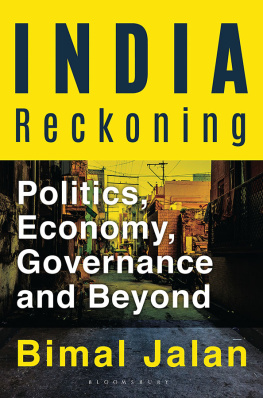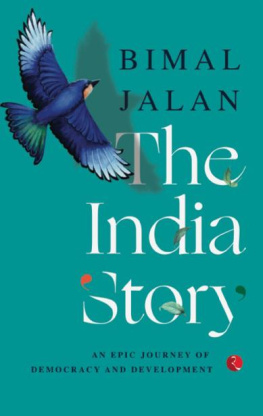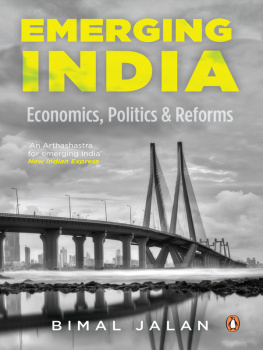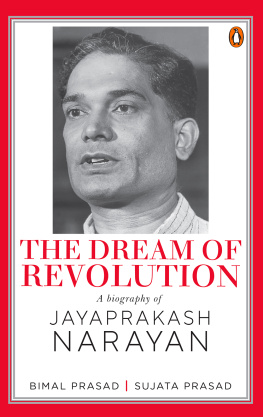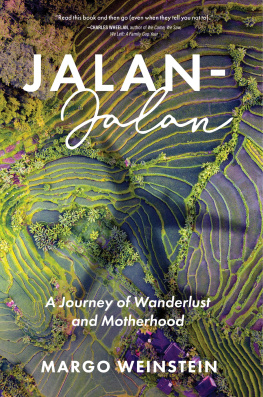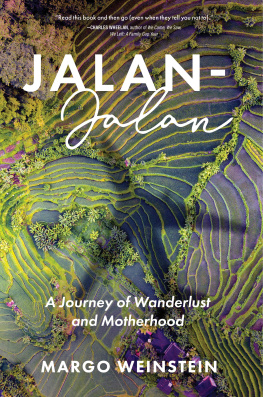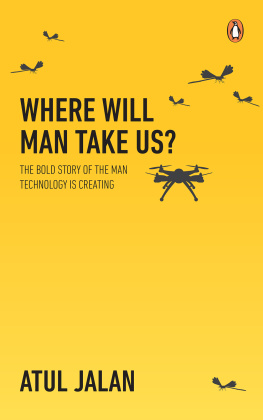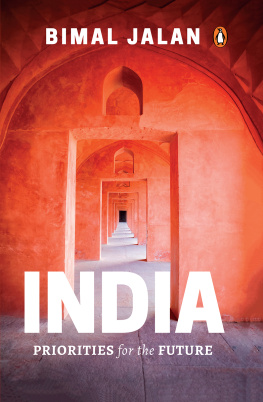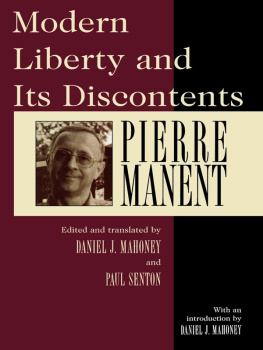Bimal Jalan - India Reckoning: Rewards and Discontents of Democracy
Here you can read online Bimal Jalan - India Reckoning: Rewards and Discontents of Democracy full text of the book (entire story) in english for free. Download pdf and epub, get meaning, cover and reviews about this ebook. year: 2021, publisher: Bloomsbury, genre: Politics. Description of the work, (preface) as well as reviews are available. Best literature library LitArk.com created for fans of good reading and offers a wide selection of genres:
Romance novel
Science fiction
Adventure
Detective
Science
History
Home and family
Prose
Art
Politics
Computer
Non-fiction
Religion
Business
Children
Humor
Choose a favorite category and find really read worthwhile books. Enjoy immersion in the world of imagination, feel the emotions of the characters or learn something new for yourself, make an fascinating discovery.
- Book:India Reckoning: Rewards and Discontents of Democracy
- Author:
- Publisher:Bloomsbury
- Genre:
- Year:2021
- Rating:4 / 5
- Favourites:Add to favourites
- Your mark:
- 80
- 1
- 2
- 3
- 4
- 5
India Reckoning: Rewards and Discontents of Democracy: summary, description and annotation
We offer to read an annotation, description, summary or preface (depends on what the author of the book "India Reckoning: Rewards and Discontents of Democracy" wrote himself). If you haven't found the necessary information about the book — write in the comments, we will try to find it.
India Reckoning: Rewards and Discontents of Democracy — read online for free the complete book (whole text) full work
Below is the text of the book, divided by pages. System saving the place of the last page read, allows you to conveniently read the book "India Reckoning: Rewards and Discontents of Democracy" online for free, without having to search again every time where you left off. Put a bookmark, and you can go to the page where you finished reading at any time.
Font size:
Interval:
Bookmark:

India Reckoning
India Reckoning
Rewards and Discontents of Democracy
Bimal Jalan

BLOOMSBURY INDIA
Bloomsbury Publishing India Pvt. Ltd
Second Floor, LSC Building No. 4, DDA Complex, Pocket C 6 & 7,
Vasant Kunj, New Delhi 110070
BLOOMSBURY, BLOOMSBURY PRIME and the Diana logo are trademarks of Bloomsbury Publishing Plc
First published in 2021
This edition published 2021
Copyright Bimal Jalan, 2021
Bimal Jalan has asserted his rights under the Indian Copyright Act to be identified as the author of this work
All rights reserved. No part of this publication may be reproduced or transmitted in any form or by any means, electronic or mechanical, including photocopying, recording or any information storage or retrieval system, without the prior permission in writing from the publishers
This book is solely the responsibility of the author and the publisher has had no role in the creation of the content and does not have responsibility for anything defamatory or libellous or objectionable
Bloomsbury Publishing Plc does not have any control over, or responsibility for, any third-party websites referred to or in this book. All internet addresses given in this book were correct at the time of going to press.
The author and publisher regret any inconvenience caused if addresses have changed or sites have ceased to exist but can accept no responsibility for any such changes
ISBN: HB: 978-93-54351-34-1; E-book: 978-93-54351-36-5
Created by Manipal Digital
To find out more about our authors and books, visit www.bloomsbury.com and sign up for our newsletters
For
Ananmay, Tanay, Mihir, and the future generations of our democracy
Contents
T his book, as its title suggests, deals with the current situation and future prospects of the country vis--vis politics, economy, and governance. As one looks deeper into Indias recent experience and that of other countries, two priorities for the future become clear. First, as is well known, global changes in technology, trade, and investment in the previous three decades have been dramatic. Many of these changes were favourable to developing countries. In particular, these changes provided immense new opportunities to countries such as India, which had a relatively mature technological and industrial base. Second, in order to benefit fully from the opportunities, it was necessary to get rid of the deadweight of the past, and take measures to maximize the benefits of Indias economic and political strength.
This book has nine chapters that cover a range of political and economic issues. Several important priorities for the future are discussed, which will help India realize its full potential as one of the fastest-growing, emerging economies in the world. Two chapters each on the financial system and politics are interconnected and some points may be repeated. In writing this book, I was principally guided by two considerations. The first was to cover different subjects that may be of interest to the general reader, in addition to professional experts. The second issue was to try and make this book relevant to the contemporary and ongoing debate on Indias approach to economic and political reforms in the 21st century.
Since 2014, India has had a single majority party in Parliament, and it is feasible for the government to launch reforms to effectively reduce corruption and administrative bottlenecks in the delivery of services to the people. This book highlights some priorities for the future that can be implemented within a relatively short period of three to four years, by 2024, when the present government completes its full term. Among the priorities are: enhancing the quality of life of citizens; reducing corruption in the administrative system; improving the role of Parliament, Executive, and Judiciary in policymaking; improving governance and politics in a resurgent India; and strengthening the functioning of the financial and banking sectors.
I am particularly grateful to Satish Choudhary for his painstaking work in preparing the manuscript for publication and to K.D. Sharma for his organizational and other help. Paul Kumar of Bloomsbury took the trouble of completing the final editing of the book within a relatively short period. I am thankful to him for his meticulous work.
T his book India Reckoning: Rewards and Discontents of Democracy has been divided into nine chapters, which discuss issues of contemporary interest relating to politics, economy, and governance. All the chapters, although interlinked, are separately discussed and highlight several issues which require urgent growth prospects and alleviation of poverty among large sections of citizens. The first two chapters are on The Evolution of Indias Democracy since Independence and The Rewards and Discontents of Democracy. Without doubt, Indias democratic politics has some highly positive features. Irrespective of caste, creed, religion, the level of income or well-being, the people enjoy all basic human freedom as a matter of right. Elections to local bodies, state legislatures, and Parliament are, broadly speaking, also free and fair. Governments have to seek periodic mandates from the people and if, voted out, they peacefully yield their place to the new government, which may have similar or radically different agenda.
The chapters also provide an overview of the functioning of Indias democracy, and the actual functioning of the three vital institutions of Indias democracyParliament, the permanent bureaucracy, and the judiciary. There have been five distinct phases in the functioning of Indias democracy since independence. The first 15 years, upto 1962, generally yielded positive results in strengthening democratic political institutions and generating faster economic growth. The second phase, upto 1979, was volatile in the political sphere. This period saw a suspension of democracy followed by a strengthening of democratic political processes. The third phase, upto 1989, was also generally good for strengthening the functioning of Indias economy and providing higher annual rates of growth. The fourth phase, from 1989 to 2004, saw the emergence of an altogether new scenario of coalition politics of parties with different ideologies. This period was marked by increasing expectations of political instability and uncertainty, which had major consequences for the functioning of democratic institutions. In the last phase during 2004 to 2020, governments in power had a majority of their own and were in a position to implement several policy reforms in the economy.
on Role of Parliament, Executive, and Judiciary discusses issues about the functioning of these institutions, and what more needs to be done to make them accountable for their actual performance on the ground for the benefit of the people. As is well-known, over time, the role of Parliament in policymaking by government in power has substantially diminished. Even the relatively fewer days on which the two Houses meet are often marked by unseemly incidents, including use of force to intimidate opponents and shutting out of debate and discussion, resulting in frequent adjournments. The responsibility of the Council of Ministers to Parliament is also largely pro forma. Over time, slowly but surely the role of bureaucracy and the executive has also been seriously compromised. The common experience of most citizens who have to deal with a government agency for any purpose, large and small, is that of insuperable problems and delays. Fortunately, the Right to Information Act, adopted in 2005, is an important step forward in making the executive accountable to the people directly.
Next pageFont size:
Interval:
Bookmark:
Similar books «India Reckoning: Rewards and Discontents of Democracy»
Look at similar books to India Reckoning: Rewards and Discontents of Democracy. We have selected literature similar in name and meaning in the hope of providing readers with more options to find new, interesting, not yet read works.
Discussion, reviews of the book India Reckoning: Rewards and Discontents of Democracy and just readers' own opinions. Leave your comments, write what you think about the work, its meaning or the main characters. Specify what exactly you liked and what you didn't like, and why you think so.

